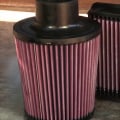Air filters are a crucial element of any home, vehicle, or HVAC system. They are responsible for filtering the air and removing dust, dirt, pollen, mold spores, mycotoxins, VOCs, and other allergens from the air. Air filters come in a variety of shapes and sizes, and can be made from a variety of materials such as fiberglass, pleated paper, polyester, electrostatic filters, and washable filters. In this article, we will discuss the different types of air filters available, how they work, and how to choose the right one for your needs.
Types of Air Filters
The most common type of air filter is the furnace filter.These are typically made from fiberglass or pleated paper and are designed to filter out dust mite allergens, mold spores, and other airborne particles. They come in a variety of sizes and MERV ratings (Minimum Efficiency Reporting Value), ranging from MERV 8 to MERV 13. A MERV 8-13 filter is ideal for most homes and vehicles. Another type of air filter is the HEPA air purifier. HEPA stands for High Efficiency Particulate Air and these filters are designed to remove 99.97% of all airborne particles down to 0.3 microns in size. HEPA air purifiers are ideal for those with allergies or asthma as they can remove dust mite allergens, mold spores, and other allergens from the air. UV filters are also available for those looking to remove bacteria and viruses from the air.
These filters use ultraviolet light to kill bacteria and viruses in the air before they can enter your home or vehicle. Finally, there are media filters which are designed to filter out larger particles such as dust and dirt. These filters are typically made from fiberglass or pleated paper and come in a variety of sizes and MERV ratings.
How Do Air Filters Work?
Air filters work by trapping airborne particles in their filter media. As air passes through the filter media, the particles become trapped in the fibers or pleats of the filter media. This prevents them from entering your home or vehicle. In addition to trapping airborne particles, air filters also help improve fuel efficiency in vehicles by preventing dirt and debris from entering the combustion chamber.This helps improve acceleration and fuel efficiency. Air filters also help improve indoor air quality by removing dust, dirt, pollen, mold spores, mycotoxins, VOCs, and other allergens from the air. This helps reduce allergies and asthma symptoms as well as improve overall health.
How to Choose an Air Filter
When choosing an air filter for your home or vehicle, it is important to consider the size of the filter as well as its MERV rating. A MERV 8-13 filter is ideal for most homes and vehicles as it will effectively remove dust mite allergens, mold spores, and other airborne particles from the air. For those with allergies or asthma, a HEPA air purifier is recommended as it will remove 99.97% of all airborne particles down to 0.3 microns in size.UV filters are also available for those looking to remove bacteria and viruses from the air. Finally, it is important to consider the type of filter media used in the filter. Fiberglass filters are typically more affordable but need to be replaced more often than pleated paper filters. Pleated paper filters are more expensive but last longer than fiberglass filters.



